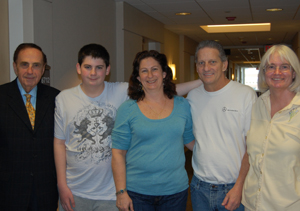 |
UNMC Chancellor and Brooklyn-native Harold M. Maurer, M.D., far left, stopped to meet fellow New Yorker Michael Manley, second from right; his wife, Patty; the Manley’s son, Chris; and Roseann Mastio, right. Michael Manley is a retired New York City policeman who traveled to UNMC to receive a kidney from his sister-in-law, Mastio, who lives in Bellevue. |
But there was a caveat.
“You can have my kidney, but it’s in Nebraska if you want it,” she told Manley.
This exchange eventually led Manley to travel to Nebraska, or “the boondocks” as his wife called it, where he received a kidney transplant and a new outlook on the heartland.
In 1992, Manley, 55, lost his left kidney after it was found to be cancerous. In 1994, he contracted an infection that went undiagnosed, ultimately causing his only remaining kidney to lose function. Last April, Manley was told the only kidney he had left would soon fail.
His condition left him with daily headaches, vomiting, fatigue and looking 20 years older.
Manley was placed on the national waiting list for a kidney. He was told he may have to wait three- to five-years to receive a donor organ in New York.
Manley, his wife, Patty, and their three children had to face hard facts. Of the more than 98,000 people nationwide waiting for an organ, more than 74,000 need a kidney, according to the Organ Procurement and Transplantation Network.
|
|
In the early 1990s, when Manley lost his first kidney to cancer, Mastio and Patty’s mother was dying of cancer and was being cared for by the Manleys in their New York home.
Since Mastio lived in Nebraska, she was unable to be involved in much of the care of her mother. She and Patty’s mother died in 1991, but Mastio swore she wouldn’t forget the efforts of her sister and brother-in-law.
“Roseann was so impressed with the help we gave our mother that she told us she would be there for us for what we did for mom,” Patty Manley said. “She said if Michael ever needed a kidney, she would donate hers.”
Mastio, 56, went through tests at UNMC’s hospital partner, The Nebraska Medical Center, to see if she was a match. She was.
“The decision was really made in 1991,” said Mastio, a nurse for Douglas County Health Department. “It was one of those things I felt would just happen.”
But Mastio wasn’t traveling to New York for the surgery. Manley had to come to Omaha.
The Manleys were reluctant but arrived at UNMC in Omaha, or, as Patty Manley said, “the boondocks” on Jan. 8.
“You know, New Yorkers believe the world revolves around them and stops at the Hudson River,” Mastio said.
Upon their arrival at the medical center, Manley began his battery of evaluations and tests and met with the transplant team. They also received a tour of the facilities, including The Lied Transplant Center.
It was then when the family’s opinion of Omaha changed.
“Every part of the process they liked better and better,” Mastio said.
Mastio’s daughter, Kathleen Caldwell, said her uncle Michael is very impressed by the people, the care and the facility.
“Before he arrived here, he was like, ‘What is the soonest I can leave?’ Now he’s not so sure he wants to go home,” said Caldwell, who works at the UNMC Munroe-Meyer Institute. “There have been all kinds of really great things about his experience here.
“He was telling me, ‘All you have to do is stand in the hall and look confused and people help you.’ He also said, ‘You don’t have a hospital here, you have a resort.'”
|
Manley’s surgery took two-and-a-half hours and Mastio’s took four-and-a-half hours.
Manley’s wife, Patty, said she noticed an immediate difference in the color of her husband’s skin after surgery.
Recovery for Manley and Mastio went well. Mastio went home three days after the transplant and Manley was discharged to The Lied Transplant Center four days later.
Because transplant recipients must periodically have laboratory tests and monitoring to ensure the immunosuppressive drugs are working well, Manley will have to make several visits to the hospital at least for the first year after transplantation.
He’s no longer hesitant about coming to Omaha. Though he could been seen at a New York hospital, he said he will fly here on his own expense probably three times this year for post-transplant care.
“People are very kind and hospitable,” Manley said. “It was something I was not accustomed to. I’ve been to many hospitals in New York. Here (in Nebraska) we had 24-hour room service. I’ve been looking for the swimming pool and sauna. I’m so impressed that I intend to get my follow-up care done here instead of in New York.”
He said there are no words to express the gratitude he feels towards his organ donor. Manley joked what Roseann did for him reinforced that he made the right decision in marrying Patty.
In Mastio’s four- to six-weeks of recovery after the transplant, she said she hasn’t been doing a lot, but she has become an organ donor advocate and is making it known.
“I’ve pretty much told everyone and their brother about this to raise awareness,” she said. “The process isn’t so bad. I was probably one of those people who thought it would be.”
Patty Manley joked that because her sister gave her husband a kidney, “She’s closer to him now than I am. She is an angel sent from God.”